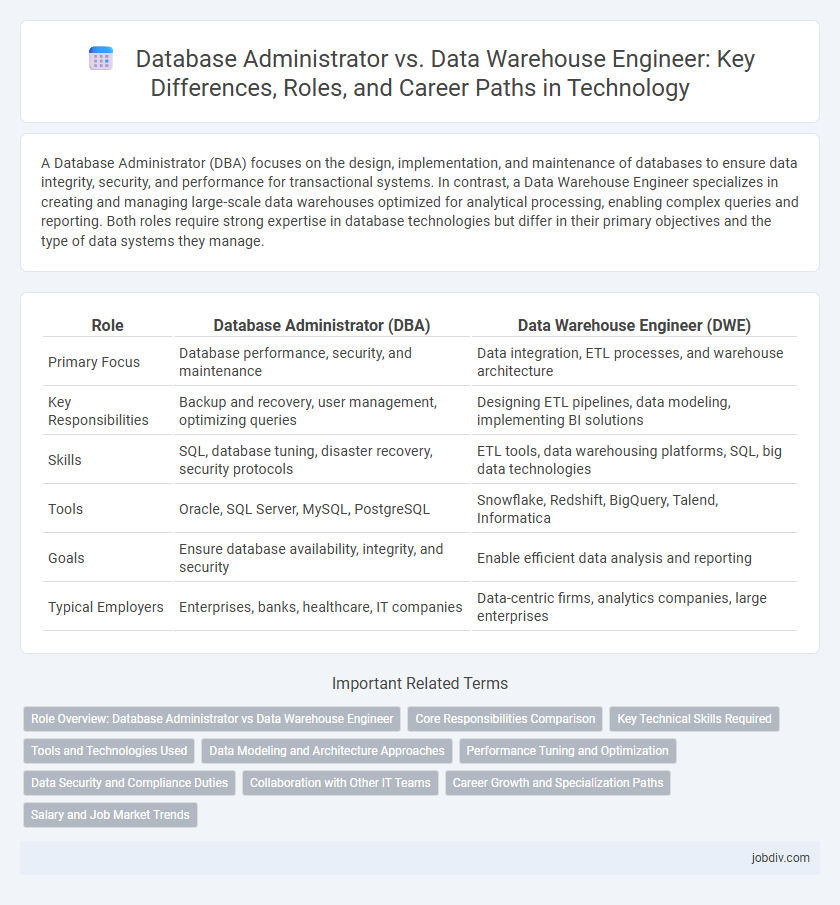A Database Administrator (DBA) focuses on the design, implementation, and maintenance of databases to ensure data integrity, security, and performance for transactional systems. In contrast, a Data Warehouse Engineer specializes in creating and managing large-scale data warehouses optimized for analytical processing, enabling complex queries and reporting. Both roles require strong expertise in database technologies but differ in their primary objectives and the type of data systems they manage.
Table of Comparison
| Role | Database Administrator (DBA) | Data Warehouse Engineer (DWE) |
|---|---|---|
| Primary Focus | Database performance, security, and maintenance | Data integration, ETL processes, and warehouse architecture |
| Key Responsibilities | Backup and recovery, user management, optimizing queries | Designing ETL pipelines, data modeling, implementing BI solutions |
| Skills | SQL, database tuning, disaster recovery, security protocols | ETL tools, data warehousing platforms, SQL, big data technologies |
| Tools | Oracle, SQL Server, MySQL, PostgreSQL | Snowflake, Redshift, BigQuery, Talend, Informatica |
| Goals | Ensure database availability, integrity, and security | Enable efficient data analysis and reporting |
| Typical Employers | Enterprises, banks, healthcare, IT companies | Data-centric firms, analytics companies, large enterprises |
Role Overview: Database Administrator vs Data Warehouse Engineer
Database Administrators (DBAs) specialize in managing, securing, and optimizing relational databases to ensure data integrity and availability for transactional systems. Data Warehouse Engineers design, build, and maintain large-scale data warehouse solutions that support advanced analytics and business intelligence by integrating diverse data sources. Both roles require expertise in SQL and data management, but DBAs focus on operational database performance while Data Warehouse Engineers optimize data architecture for analytical processing.
Core Responsibilities Comparison
Database Administrators (DBAs) primarily manage and maintain operational databases, ensuring data integrity, security, and optimal performance for transactional systems. Data Warehouse Engineers design, build, and optimize large-scale data warehouses, focusing on data integration, ETL processes, and supporting business intelligence analytics. Both roles require expertise in SQL and data management, but DBAs emphasize real-time database availability while Data Warehouse Engineers prioritize efficient data storage and reporting.
Key Technical Skills Required
Database Administrators require expertise in SQL, backup and recovery techniques, performance tuning, and database security to manage and maintain relational database systems effectively. Data Warehouse Engineers need strong skills in ETL processes, data modeling, OLAP, and proficiency with tools like Apache Hadoop, Snowflake, or Amazon Redshift for designing and optimizing large-scale data storage solutions. Both roles demand a deep understanding of data architecture, but Data Warehouse Engineers emphasize analytics and big data technologies, while Database Administrators focus on transactional database management.
Tools and Technologies Used
Database Administrators primarily utilize relational database management systems (RDBMS) such as Oracle, Microsoft SQL Server, and MySQL for maintaining database performance and security. Data Warehouse Engineers focus on ETL tools like Informatica, Talend, and Apache NiFi, along with big data platforms including Apache Hadoop and cloud services such as Amazon Redshift and Google BigQuery for data integration and analytics. Both roles employ scripting languages like SQL and Python, but Data Warehouse Engineers often work extensively with OLAP tools and data modeling frameworks to optimize large-scale data storage and retrieval.
Data Modeling and Architecture Approaches
Database Administrators primarily focus on optimizing and maintaining transactional databases using normalized data models to ensure data integrity and efficient day-to-day operations. Data Warehouse Engineers design and implement dimensional data models such as star and snowflake schemas to support complex analytical queries and large-scale data integration. Their architectural approaches differ, with DBAs prioritizing OLTP system performance and Data Warehouse Engineers emphasizing OLAP systems for business intelligence and reporting.
Performance Tuning and Optimization
Database Administrators specialize in performance tuning by optimizing indexes, managing query execution plans, and ensuring low-latency transaction processing in operational databases. Data Warehouse Engineers focus on optimizing ETL processes, designing efficient data models, and implementing partitioning strategies to enhance large-scale analytical query performance. Both roles require deep expertise in SQL optimization, but Data Warehouse Engineers prioritize scalability and batch processing efficiency over real-time transaction speed.
Data Security and Compliance Duties
Database Administrators (DBAs) manage data security by implementing access controls, performing regular audits, and ensuring database encryption aligns with organizational policies to maintain data integrity and confidentiality. Data Warehouse Engineers focus on safeguarding large-scale data repositories by integrating compliance frameworks such as GDPR and HIPAA into ETL processes, ensuring secure data storage and regulated data flow across systems. Both roles collaborate on data governance to enforce policies that prevent unauthorized access and support regulatory reporting requirements.
Collaboration with Other IT Teams
Database Administrators collaborate closely with system administrators and network engineers to ensure optimal database performance and security, facilitating seamless data flow across platforms. Data Warehouse Engineers work alongside data scientists and BI developers to design and maintain scalable data infrastructure that supports complex analytics and reporting. Both roles require synchronized efforts with software developers and IT support teams to maintain data integrity and streamline business intelligence processes.
Career Growth and Specialization Paths
Database Administrators (DBAs) typically focus on managing, maintaining, and securing operational databases, providing critical support for everyday business applications, while Data Warehouse Engineers specialize in designing, building, and optimizing large-scale data storage solutions for analytics and decision-making purposes. Career growth for DBAs often leads to roles such as Database Architect or Database Security Specialist, emphasizing expertise in database management systems, backup, and recovery processes. Data Warehouse Engineers advance toward positions like Data Architect or Analytics Engineer, requiring deep specialization in ETL processes, data modeling, and big data technologies, aligning with evolving trends in business intelligence and data-driven strategies.
Salary and Job Market Trends
Database Administrators typically earn an average salary ranging from $80,000 to $110,000 annually, with demand driven by organizations needing efficient data management and security. Data Warehouse Engineers command higher salaries, often between $100,000 and $130,000, reflecting their specialized skills in designing and maintaining data warehouses for advanced analytics. Job market trends indicate a growing preference for Data Warehouse Engineers due to increasing investment in big data and business intelligence technologies.
Database Administrator vs Data Warehouse Engineer Infographic

 jobdiv.com
jobdiv.com